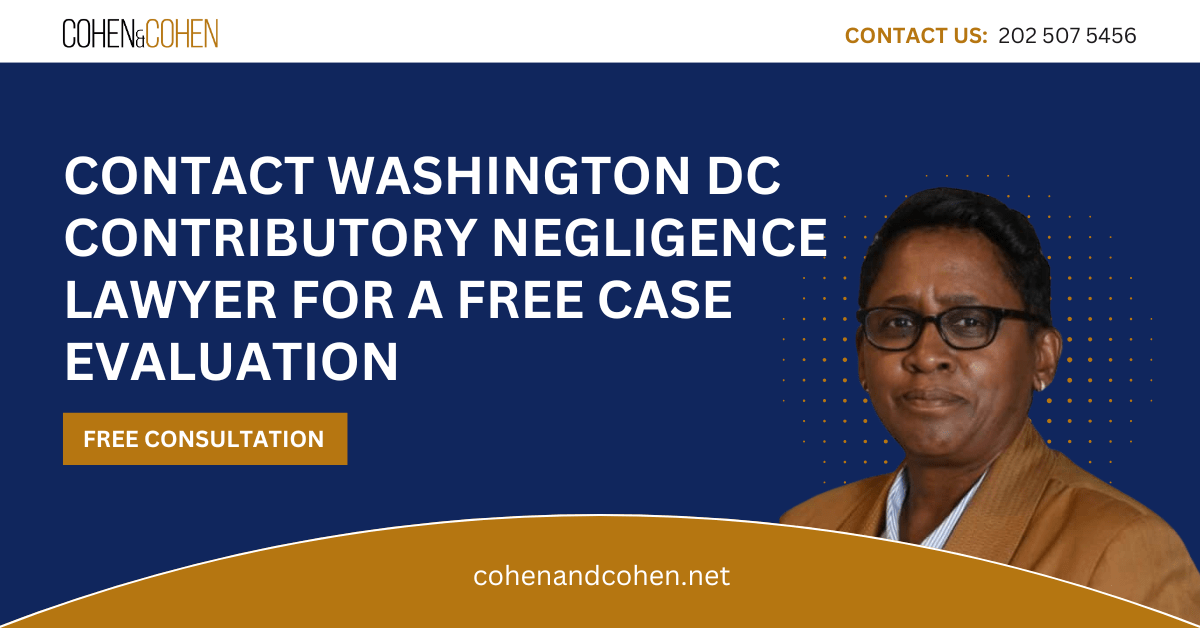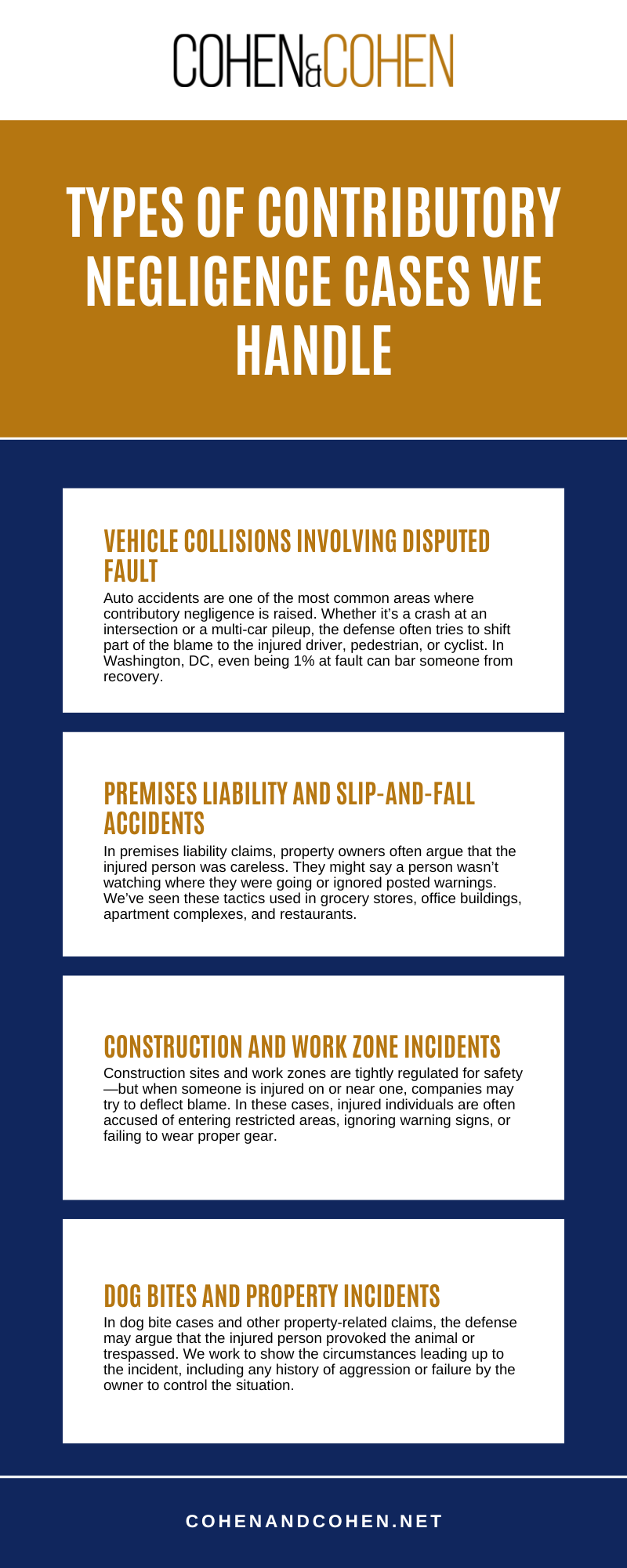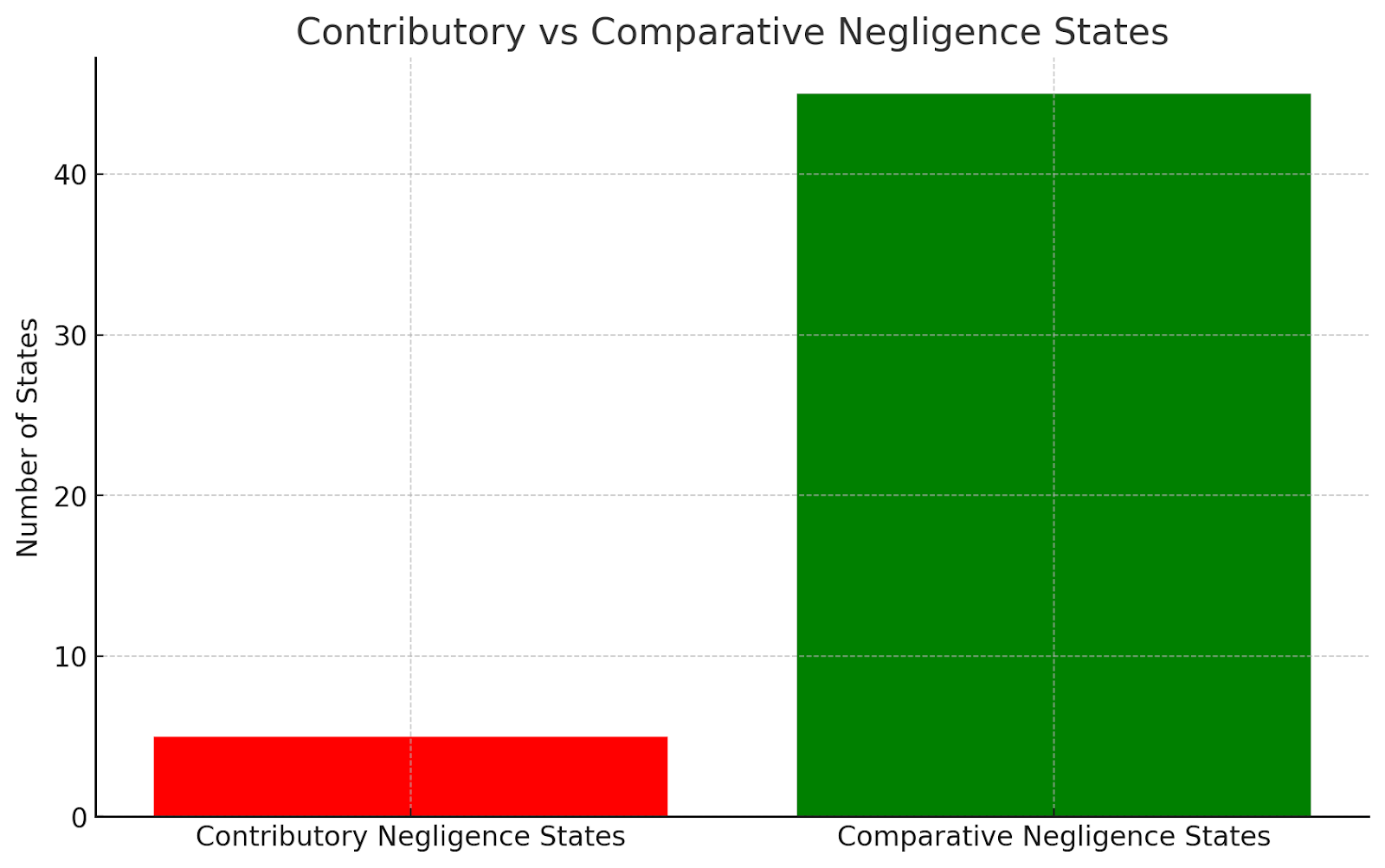Appearing On:
















Serious injuries deserve experienced attorneys

At Cohen & Cohen, we help people who have been injured in accidents where the other side claims the victim was partially at fault. These cases often involve added pressure, with insurance companies arguing that any small mistake by the injured person means they shouldn’t be compensated. Our Washington DC contributory negligence lawyer understands how frustrating this can be—and we know how to push back with facts. Our team works to protect our clients from losing their right to recover damages based on unfair legal standards.
Contributory Negligence Lawyer Washington DC
Contributory negligence is a legal rule that can block an injured person from recovering damages if they are found even slightly at fault for the incident. This rule is used in only a few states, including Washington, DC. It’s a strict and often unfair standard that can be used by insurance companies and defense attorneys to avoid paying out on valid injury claims.
Our Washington DC contributory negligence lawyer can help clients respond to these tactics by gathering evidence and showing that the other party’s actions—not the injured person’s—caused the harm.
Some common scenarios where this defense comes up include:
- A pedestrian is struck by a driver but is blamed for crossing the street outside a marked crosswalk
- A driver is hit in an intersection but is accused of going slightly over the speed limit
- A cyclist is hit by a car and the driver argues the cyclist wasn’t wearing reflective gear
Even if the victim is found to be just 1% responsible, they may be denied compensation entirely under this rule. That’s why it’s critical to build a strong case from the start, using clear documentation, accident reconstruction, and witness testimony.
We focus on what really matters: the conduct of the person who caused the injury. Did they break a traffic law? Were they distracted or under the influence? Did they fail to take reasonable precautions? These are the facts that matter in court—not small mistakes made by the person who got hurt.
Why Experience and Strategy Make the Difference
At Cohen & Cohen, we’ve handled many injury cases where the issue of shared fault comes into play. Our team is familiar with how defense teams try to use contributory negligence to avoid responsibility, and we know what to look for to protect our clients’ rights.
In one case, our client was injured in a crosswalk accident. The defense argued that our client’s view was obstructed, but our investigation showed that the driver had been texting and failed to slow down. We were able to shift the focus back where it belonged—on the actions of the driver—and secured compensation for medical bills, pain, and lost income.
We also use outside professionals, including investigators and accident experts, to help build a clear timeline and demonstrate who was truly at fault.
Talk to a Legal Team That Can Step In Early
If someone is trying to blame you for your own injury, don’t face that alone. A Washington DC contributory negligence lawyer at Cohen & Cohen can review your situation and help protect your right to recover. Contact us today for a free consultation—we’re ready to help you move forward with clarity.

Types of Contributory Negligence Cases We Handle
Injury cases are rarely simple. When the other side claims you share some of the blame, it can change the outcome entirely—especially in a jurisdiction like DC, where contributory negligence laws apply. At Cohen & Cohen, we work with people who have been seriously hurt, only to have insurers argue that their actions should prevent them from receiving any compensation. These cases require a clear legal strategy and careful handling of facts, which is exactly what we provide.
Vehicle Collisions Involving Disputed Fault
Auto accidents are one of the most common areas where contributory negligence is raised. Whether it’s a crash at an intersection or a multi-car pileup, the defense often tries to shift part of the blame to the injured driver, pedestrian, or cyclist. In Washington, DC, even being 1% at fault can bar someone from recovery.
We handle cases where:
- A cyclist is hit by a turning vehicle and blamed for not using a bike lane
- A pedestrian in a crosswalk is struck, and the driver claims the person stepped into the street too quickly
- A driver is rear-ended but accused of braking without reason
We focus on showing the full picture—often using footage, police reports, and witness accounts—to establish that the other party’s actions were the actual cause of the harm.
Premises Liability and Slip-and-Fall Accidents
In premises liability claims, property owners often argue that the injured person was careless. They might say a person wasn’t watching where they were going or ignored posted warnings. We’ve seen these tactics used in grocery stores, office buildings, apartment complexes, and restaurants.
Examples include:
- Someone slipping on a wet floor with no visible signage
- A tenant falling down dimly lit stairs in a rental unit
- A customer tripping over uneven flooring or loose mats
Our job is to show that the hazard was unreasonable and that the property owner failed to correct or warn about a dangerous condition in time.
Construction and Work Zone Incidents
Construction sites and work zones are tightly regulated for safety—but when someone is injured on or near one, companies may try to deflect blame. In these cases, injured individuals are often accused of entering restricted areas, ignoring warning signs, or failing to wear proper gear.
We handle claims involving:
- Pedestrians hurt near roadside construction projects
- Workers injured due to unsafe conditions not clearly marked
- Visitors or contractors injured while lawfully present on-site
We investigate safety protocols, site conditions, and communication from supervisors or managers to determine if responsibility truly lies with the injured person or if corners were cut by the party in charge.
Dog Bites and Property Incidents
In dog bite cases and other property-related claims, the defense may argue that the injured person provoked the animal or trespassed. We work to show the circumstances leading up to the incident, including any history of aggression or failure by the owner to control the situation.
Whether it’s a residential injury or something that occurred in a public space, we focus on presenting clear evidence of negligence.
Speak With a Team That Knows How to Handle These Claims
When you’re being blamed for your own injury, it’s important to act quickly. A Washington DC contributory negligence lawyer at Cohen & Cohen can help you understand your legal position and fight to protect your rights. Contact us today for a free consultation. We’re ready to help you take the next step.
6 Steps We Recommend After Fault Is Disputed
When you’re injured and the other side claims you were partly at fault, your case becomes much harder—especially in places like DC, where contributory negligence rules can block compensation entirely. At Cohen & Cohen, we’ve helped clients through these situations by acting quickly, gathering the right information, and building strong arguments to push back. If you’re facing these accusations, taking the right steps early on can protect your case.
Get Immediate Medical Treatment And Follow Up
Even if your injury seems minor, seek medical attention right away. Insurance companies often use delays in treatment to question the seriousness of your injuries or claim that something else caused them. More importantly, consistent medical care builds a clear record of what you’re dealing with.
Keep track of:
- Emergency room visits, diagnoses, and referrals
- Any prescriptions or therapy recommendations
- How your condition changes in the days and weeks after the incident
Medical records become essential in showing the injury’s full impact and connecting it directly to the event.
Document The Scene And Gather Evidence
Details matter in contributory negligence cases. You’ll want to preserve as much evidence as possible to help your legal team challenge claims that you were even slightly responsible.
Make sure to collect:
- Photos of the scene, including hazards, vehicles, or warning signs
- Names and contact information of witnesses
- Copies of police or incident reports
We also recommend writing down what happened while it’s still fresh. Even small details can help support your version of events and fill in gaps if the other side makes incorrect claims.
Avoid Admitting Fault Or Making Statements
Right after an accident, emotions are high and it’s easy to say things that could later be used against you. Even something as simple as “I didn’t see them” could be interpreted as an admission of fault.
When speaking with others—especially insurers—keep it brief. Don’t:
- Offer your opinion about who was at fault
- Say you’re feeling fine if you’re still waiting on a diagnosis
- Sign anything without having it reviewed
Let them know you plan to speak with our lawyer and prefer all communication to go through that channel.
Track All Expenses And Missed Time
In contributory negligence cases, insurance companies often try to argue that your damages aren’t as high as you claim. Keeping clear records of costs, time missed from work, and ways your life has been impacted can strengthen your case and make sure no part of your recovery is overlooked.
Examples include:
- Hospital bills and out-of-pocket expenses
- Pay stubs showing lost income
- Receipts for transportation, therapy, or medical equipment
The more documentation you have, the easier it is to build a full picture of your damages.
Stay Consistent With Your Story
If your version of events starts to shift—even a little—defense teams may use that to suggest you weren’t being truthful. From your initial report to your conversations with medical providers, staying consistent helps your credibility and keeps the focus on the other party’s actions.
We recommend going over your account of the incident with our lawyer so you feel confident in how you describe what happened. That way, if you’re questioned later, your statements stay strong.
Talk To Your Attorney Before The Case Goes Further
Contributory negligence laws in DC are strict. One small mistake in how your case is handled can cost you the right to recover damages. A Washington DC contributory negligence lawyer at Cohen & Cohen can help review your situation and build a strategy that gives your case the best chance. Contact us today for a free consultation—we’re ready to help you move forward with confidence.
Washington DC Contributory Negligence Infographic

Washington DC Contributory Negligence Statistics
Contributory negligence is a legal doctrine that can significantly impact personal injury claims in the United States. Under this principle, if a plaintiff is found to have contributed in any way to their injury, they may be barred from recovering damages. This strict rule is still in effect in a few jurisdictions, including Alabama, Maryland, North Carolina, and Virginia, as well as the District of Columbia.
In these states, even a minor degree of fault—such as being 1% responsible for an accident—can result in the complete denial of a personal injury claim. For instance, a North Carolina resident faced a $1,500 repair bill after her car was damaged by a valet. Despite the valet being partially at fault, her insurance claim was denied due to the state’s contributory negligence law, which prevents compensation if the claimant is even 1% at fault.

Washington DC Contributory Negligence FAQs
In most personal injury cases, the focus is on proving that someone else was at fault. But what happens if the injured person also shares some blame for the accident? That’s where contributory negligence becomes a key issue. In certain states, including the District of Columbia, even a small amount of fault on the part of the injured person can block them from recovering any compensation. If you’ve been injured and think you may have played a small role in what happened, it’s important to understand how contributory negligence might affect your case and your legal options.
Who does contributory negligence affect?
Contributory negligence laws apply to personal injury plaintiffs—people who are seeking compensation after an accident or injury. In Washington, DC, if a plaintiff is found to be even one percent at fault for the incident that caused their injury, they may be barred from recovering damages. This applies in car crashes, slip-and-fall cases, pedestrian accidents, and more. These rules make DC one of the most restrictive places in the country when it comes to fault. That’s why injured people often need careful legal help when contributory negligence may come into play.
What is contributory negligence in simple terms?
Contributory negligence is a legal rule that prevents someone from receiving compensation if they contributed to their own injury—even slightly. For example, if a pedestrian crosses the street outside of a marked crosswalk and gets hit by a speeding driver, a court might find the pedestrian 5% at fault for jaywalking. Under contributory negligence, that 5% could eliminate their entire claim. Unlike comparative negligence, which reduces compensation based on the share of fault, contributory negligence blocks recovery altogether if any blame is placed on the injured person.
Why does contributory negligence matter in personal injury claims?
It matters because it can determine whether or not a person receives any compensation at all. Many people assume that if someone else was mostly at fault, they will be able to recover something—but in Washington, DC, that isn’t always true. Insurance companies often use contributory negligence to deny claims or reduce payouts. If they can prove the injured person made any mistake that contributed to the incident, they may argue that no compensation is owed. This makes it especially important to build a strong case with accurate facts and clear legal strategy.
How can legal support help with contributory negligence?
Legal help can make a major difference in cases where contributory negligence might apply. An attorney can gather evidence, challenge the other party’s version of events, and build arguments to show that the injured person did not contribute to the accident. At Cohen & Cohen, we handle these situations with care and attention to detail. If you’re looking for a Washington DC contributory negligence lawyer, our team can assess your case, explain your legal rights, and push back against unfair fault claims that could threaten your recovery. Timing and documentation are both critical in these cases.
Who decides whether contributory negligence applies?
Ultimately, a judge or jury may decide if contributory negligence applies, but the process often begins with insurance companies making that argument. During claim reviews, insurers may try to assign partial fault to reduce their financial responsibility. In a lawsuit, both sides present evidence, and the court evaluates whether the plaintiff shares any blame. The decision is based on witness statements, physical evidence, expert opinions, and how state or local laws are interpreted. Legal counsel can help prepare your case to avoid or minimize claims that you were partially at fault.
Cohen & Cohen, Washington DC Contributory Negligence Lawyer
1730 Rhode Island Ave NW # 410, Washington, DC 20036
Read more of our Google reviews and let us know how we can help with your legal issue.
Contact Our Washington DC Contributoy Negligence Lawyer Today
Contributory negligence cases in Washington, DC are among the most unforgiving in personal injury law—but you don’t have to face them alone. At Cohen & Cohen, we understand the pressure injured individuals face when the other side tries to shift even a small portion of the blame. Our team is here to level the playing field. With strategic preparation, strong evidence, and a clear focus on the facts, we work to protect your right to full and fair compensation. If you’ve been injured and fault is being disputed, contact us today for a free consultation. Let us help you push back and move forward.
Personal Injury Attorneys In:
Washington DC | Maryland | Virginia
“Cohen & Cohen did a great job at recovering a good amount of money for me after my accident. Siri was super informative & responsive. Overall I had a great experience using this firm & they will be my first call if I am ever in an accident again.”
– Charles M.
 Personal Injury Accident
Personal Injury Accident
“I had a very positive experience with Cohen & Cohen and I highly recommend them to anyone who needs their services.”
– John G.
 Tractor Trailer vs Car
Tractor Trailer vs Car
“I would highly recommend Cohen & Cohen. They were awesome on my case. Cohen & Cohen had my best interest at heart at all times.”
– Morgan L.
 Personal Injury Accident
Personal Injury Accident
“My experience at Cohen & Cohen has been great from the beginning until the very end when my case was closed…I would definitely recommend them to family, friends or anyone that has a case with a personal injury accident.”
– Maria M.
Reviews
From Our Valued Clients
Cohen & Cohen has an impeccable client satisfaction rating with hundreds of 5-star reviews. We are among the best-rated firms in D.C., Virginia, and Maryland.

Best Personal Injury Lawyer in DC








Cohen & Cohen Has Been Featured On


















